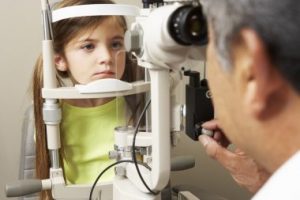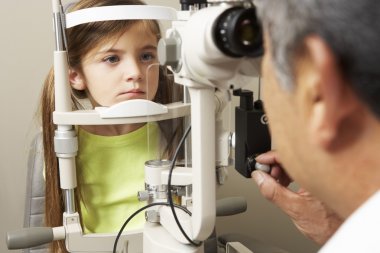PRK and LASIK are state-of-the-art eye correction procedures that use leading-edge lasers. Most children will not require an operation in order to treat an eye disorder or condition. However, surgery may be a viable option in some rare cases. While corrective eye surgery is uncommon among children, it has been shown to be very effective.
Patients with severe anisometropia will benefit from laser eye correction. Patients who suffer from high bilateral refractive errors will also benefit from laser eye correction. As well, it should be noted that children are at an elevated risk of developing certain eye conditions when compared to adults.
Corrective eye procedures such as LASIK or PRK may prevent children from having to wear contacts or glasses in the future. Here, our focus will be on which of the two procedures is ideal for children.
LASIK Laser Eye Surgery
LASIK serves as a top-of-the-line refractive eye surgery. It has an impressive track record. However, like with any other type of surgery, there are risks. Your doctor will discuss all of its potential risks before the procedure takes place.
It is a common type of refractive surgery that is designed for people who do not wish to wear glasses or contacts for the sake of convenience. It must be performed by a highly qualified and professional surgeon. LASIK is usually performed by a surgeon who specializes in ophthalmic surgery.
LASIK is a quick and painless procedure. In most cases, your surgeon should be able to perform the operation on both of your eyes on the same day.
The vast majority of patients who undergo LASIK do not report any long-term side effects or complications. After the surgery has taken place, you will be expected to rest at the clinic for a few hours. You will then be allowed to leave the clinic with a guardian.
PRK Laser Eye Surgery
Photorefractive keratectomy (PRK) rectifies refractive errors in the eyes in order to improve the vision of the patient. PRK surgery actually predates LASIK eye surgery, and takes between 5 and 10 minutes to perform on each eye.
PRK is also a type of surgery that does not require the patient to be put under a general anesthesia. Instead, the eyes of the patient are numbed using a topical anesthetic, such as eye drops. PRK is a very fast procedure. The entire procedure, including the initial setup, will usually only take about half an hour at the longest.
LASIK or PRK: Which one is better for children?
Both LASIK and PRK were designed to rectify refractive vision issues by reshaping the cornea of the patient. The majority of doctors do not recommend that children undergo LASIK. Only under extreme circumstances should LASIK or PRK be considered an option for children.
PRK is also rarely recommended for youths, especially young children. However, there have been documented cases where children have undergone either PRK or LASIK in order to correct vision problems.
The reason why LASIK or PRK are not commonly performed on children is because their eyes are still developing. Experts are currently conducting clinical studies on the efficacy of laser eye surgery in children with rare vision defects or anomalies.
The recovery time for PRK is longer than LASIK, as it will take 3 to 4 days for new cells to form. The risk of flap problems is also non-existent. As well, the risk of removing many sections of the cornea is minimal.
However, the amount of effort required to perform laser eye surgery on children is greater than it is on adults. More logistical planning is also required, which is why it is rarely recommended for children. Although the laser eye correction method has many benefits for adults, the risk of complications is high when applied to children.

What is the best age for LASIK?
The FDA has not approved LASIK for persons under the age of 18. As mentioned, children’s eyes will continue to develop as they age. If a child receives LASIK treatment, then their eyes continue to develop after the surgery, it may lead to unexpected results.
In fact, a person’s eyes will continue to develop until the age of 21. It is for this reason that most ophthalmologists recommend LASIK for patients 21 years and older. The risk of the cornea changing after LASIK will be virtually zero once a person reaches the age of 21.
The Future of LASIK for Children
Some studies have found that LASIK may be able to help children who suffer from pronounced nearsightedness or farsightedness. Left untreated, these children may develop what is known as eye atrophy due to minimal use.
Still, even for children with such vision problems, LASIK is considered a last resort. In most cases, doctors will ask that the child wear contact lenses in order to try to treat their eye condition. If all else fails, LASIK may then be considered a viable option to treat their rare eye condition.
More than Meets the Eye
As already mentioned, LASIK and PRK are procedures that are rarely performed on children due to their developing eyes. However, there have been documented cases of PRK and LASIK being performed on children in order to treat rare vision problems.
If you have children who suffer from unusual vision problems, then please speak to an opthamologist. They will perform the necessary tests in order to determine the cause of the issue.
LASIK or PRK may be able to treat their vision problems, but your doctor will first exhaust all other treatment alternatives before suggesting either procedure. Left untreated, vision issues will only get worse. In extreme cases, the patient may become blind, so it is best to treat vision problems as soon as possible.
For more information, contact your local vision clinic.








